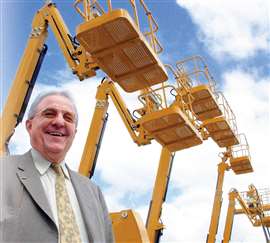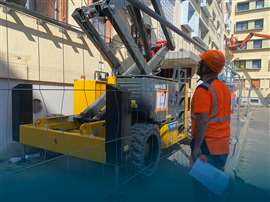“People are obliged to be cautious”: Haulotte chief warns Trump tariffs likely to slow investment into US
09 April 2025
In an interview marking the 40th anniversary of his father’s acquisition of Haulotte, chief executive Alexandre Saubot, tells Lucy Barnard how Europe’s largest access platform manufacturer is navigating Donald Trump’s new trade tariffs and the recently imposed charges on Chinese MEWPs entering the EU
Like manufacturers all over the world, French mobile elevated work platform specialist Haulotte is trying to work out how to react to new US trade tariffs.
President Donald Trump imposed a raft of new import taxes on all goods entering the US last week aimed at boosting US manufacturing and which he promised would “make America wealthy again.”
The tariffs add an extra 10% on all imports to the US and were originally set to include higher rates on imports from around 60 countries including the EU and China. Trump later announced a 90 day pause on imposing the higher rate tariffs on good from all countries except China.

For Haulotte, which manufactures some of its products in the US, some in France, some in Romania and some in China, the new taxes are likely to act as a barrier to further investment in the US, the chief executive tells International Rental News.
“For me, the biggest impact is on the investment decision,” says Alexandre Saubot, Haulotte’s chief executive and part of the family which for the last forty years has been the company’s largest shareholder. “People are obliged to be cautious until they know what is really going on.”
“It’s too early to make big investments into the US until we know better how all that has stabliised,” says Saubot. “You just put a few things on hold when it’s a long-term decision and you adapt to see how it has stabilized. I’m sure all my competitors are doing the same.”
Haulotte, which is the world’s third largest MEWP manufacturer, has been producing access platforms since the inception of the modern access market in the 1980s and has a longstanding presence in the US.
The company currently manufactures light weight trailer mounted boom lifts and light weight self-propelled boom lifts as well as some models of electric scissor lifts and telescopic booms at a facility in Archbold, Ohio while the company distributes parts and provides in-house customer care at its 84,000 square foot corporate headquarters in Virginia Beach, Virginia. However, the rest of its US products are made in the company’s other global factories.
“We have production capacity in the US – not for all the range – but we have a factory in the US just like we have a factory in China,” says Saubot. “Of course, having high tariffs implemented will challenge the supply chain, the production cost and all that. But for me, the biggest impact will be on US manufacturers because their supply chains are integrated with products and components coming from all around the world.”
Strategy to be local
North America remains the company’s largest market outside Europe and Saubot says the company had been planning to grow production in the region.
“Our strategy is always to be local. So, the plan was to have production capacity in Asia for Asia, production capacity in Europe for Europe and production capacity in America for America,” Saubot says.
“The main impact for us is the supply base we have in North America which, like everyone else, was part of a plan to include Mexico and Canada. Will that still be on the table and for how long? Because the other question is how long you see this change in position. You cannot make a decision today based on a tariff which could be gone in two weeks and reapplied in another two months.”
 The Haulotte factory in 1975.
The Haulotte factory in 1975.
“In the meantime, if I can import at a good price I will keep doing it. And if I cannot, I will try to sell somewhere else.”
For Haulotte, a company which traces its industrial roots back to the 1880s and which was acquired by Saubot’s father Pierre in 1985 to concentrate on the emerging aerial work platforms market of the time, navigating a path around new US tariffs is just one further trade issue to deal with in an increasingly global and complex marketplace.
While Saubot sees US tariffs as a clear challenge to overcome, he supports the decision by the European Union to impose its own tariffs on MEWPs manufactured in China and entering the EU.
The new tariffs, which have been levied on the products of some Chinese MEWP manufacturers since the start of the year, follow an ‘anti-dumping’ investigation in response to complaints from European manufacturers thought to include Haulotte and Manitou.
Saubot says because so many machines were imported into the EU before the new charges were applied, any effects are unlikely to be seen on the market until 2026.
“Then it depends on the behaviour of the competition,” Saubot says. “I never bet on the behaviour of the competition. I try to envisage all of the options and be ready for all of them. They will have to decide if they increase their selling price or if they squeeze their margin to keep where they are. That’s not my call. The worst thing for us is if they squeeze their margins and the tariffs have no effect but they also need to make money one day.”
“Never underestimate the Chinese competition”
Certainly, Saubot sees the entry into the market by new Chinese competitors as the biggest change to the access market in the forty years that Haulotte has been operating in it.
“Never underestimate the Chinese competition. They are good. I hope they are not as good as we are, but they are good,” he says. “They have a speed of development and a range, elements of which are obviously not accessible to a Western managed company that has to make profits.”
“You have western businesses where the market has been stable for the last twenty years with limited changes and where everyone is playing by the same rules. We all have the same constraints. We are customer oriented. We invest a lot in R&D. And alongside that, you have the Chinese companies where there are twenty, forty, a hundred. What is funny is that when you go to an exhibition today, you always see a new batch of Chinese companies popping up showing products and then two years later, it’s a new batch.”
 Pierre Saubot.
Pierre Saubot.
Saubot was still a student at university in 1985 when his father Pierre took the brave decision to buy Haulotte, alongside fellow French heavy industry firm Pinguely from the bankrupt steel conglomerate Creusot-Loire and to concentrate manufacturing on the nascent access platform market.
For him, he says, the biggest effect at the time was having to move house because Pierre sold the family apartment in order to invest all his assets and savings in the business.
“I was too young to have a different evaluation at the time and not experienced enough. It was what he wanted to do, to have his own business and to take risks. The only thing I can say is I’m not sure I would have been brave enough to do what he did,” he says.
Helped by the fast growing moving elevated work platform (MEWP) market and by new European legislation governing above ground work, under Saubot Senior’s guidance, Haulotte and Pinguely (which later became Pinguely-Haulotte and then Haulotte Group) went from being legacy a business of 50 people facing a doubtful future to a company employing more than 1,500 staff and with revenues of €387.8 million (US$425.3 million) twenty years later.
In 2004, Alexandre took charge of the business from his father. Weathering the global financial crisis in 2008 and the covid pandemic in 2020, the company has continued on its growth trend, increasing sales to a record €767 million (US$841 million) in 2023.
“When I took over in 2004, it was already a consolidated business with decent equity and a commercial network so it was about growing the business to implement processes so as not to lose the dynamism and the entrepreneurial spirit and to renew and build a team because many of the key people who worked with my father were about his age and they were due to retire,” he says.
Scaling up
“I can easily recognise that moving from €5 million to €200 million is much more difficult than moving from €200 million to €700 million, even though it’s more millions, it’s definitely the multiple that is the biggest challenge. Clearly we’ve still had our challenges but it’s not the same.”
Although Haulotte has been testing a prototype hydrogen fuel cell powered scissor lift with Equans France since 2022, Saubot says that any further attempts at trying to commercialise such machines will have to wait until costs for hydrogen propulsion systems come down and interest from potential customers increases.
 The hydrogen range extender.
The hydrogen range extender.
And Haulotte continues to produce diesel-powered as well as both lead acid and lithium battery powered machines.
“We offer all kinds of energy sources as long as they are competitive,” Saubot says. “I’m sure I can offer everything they want and then I adjust my production to their demands. We try to have all the options and know the advantages and disadvantages of each. And we try to figure out with the customer what is what according to our expertise. But in the end, it’s their call.”
So, with Haulotte celebrating forty years since the Saubot family transformed the business, what are the plans for the next forty years and will the business still be in Saubot hands?
“You can make comments about the next forty years, but the reality is that at my current age, I probably won’t be there to celebrate. It’s too far away,” he says. “The reality is to look at the next five or ten years and are these plans good enough for your business.”
STAY CONNECTED



Receive the information you need when you need it through our world-leading magazines, newsletters and daily briefings.
CONNECT WITH THE TEAM







